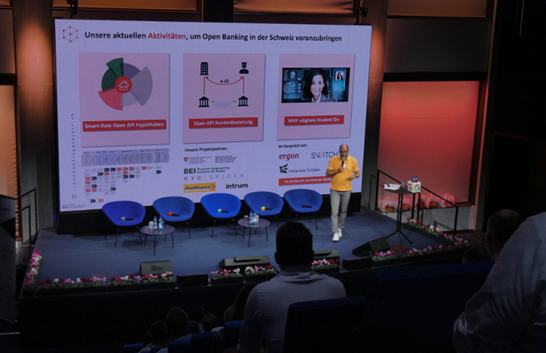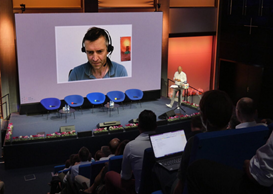After the successful Summit 2022, the doors opened again on the 24th of August at Google in Zurich for this year's Open Banking Summit. With over 100 participants and top-class speakers, the OpenBankingProject.ch once again proved to be an essential business network in the context of Open Banking.
The opening by Roi Tavor, Managing Director @ Google Cloud, and the unveiling of the agenda by Thomas Zerndt, CEO @ Business Engineering Institute, promised a lot. Impulse presentations on the progress of Open Banking in Switzerland and in the international context, developments from Open Banking towards an Open Economy and the findings on PSD2/PSD3 were to form the starting point of the programme. After key notes on concrete implementation projects of Deutsche Bank, Hypi Lenzburg, the standardisation project "Open API Customer Relationship" and a panel discussion, the talks and discussions were to be continued at the subsequent aperitif. Once again, many thanks to our host Google for the renewed opportunity to hold these events in Zurich.
At the beginning, Daniel Bänziger from the Business Engineering Institute offered an overview of the driving factors and current framework conditions in the area of Open Banking in Switzerland. Looking at the constantly changing landscape, it becomes clear how important common standards and the opening of interfaces are in order to create scalable solutions for third-party access. The current map of standards, key players and ongoing initiatives presents a clear picture that there must be added value for the end customer. As Bänziger aptly puts it, "The clock is ticking, the market-oriented approach is on trial". To further drive Open Banking, important activities of the OpenBankingProject.ch are underway, including Smart Data Open API for mortgages and an Open API for customer relationships, as well as the development of an MVP for a "digital student card".

Marie Walker, Open Futurist @ Radiam, gave an insight into the global landscape of Open Banking. The overarching trend in the financial industry is a move towards more openness, but it is important to note that Open Banking takes different forms in different countries and often goes beyond traditional boundaries. There is a notable shift towards Open Finance and Open Data, emphasising that this is not just a regulatory or technical endeavour, but requires a client-centric and cross-industry approach. The Swiss financial centre, with its unique positioning, can act as a "smart mover" here.
Dr. Ortwin Scheja, Management Consultant of the Berlin Group, addressed the practical implementation of PSD2. The concept of Request to Pay crystallised as a potential new standard or field of innovation for customers and banks. Dr. Scheja also gave a detailed overview of the developments in Open Banking and highlighted the significant potential that can be realised by banks. In addition, he provided insights into what we can expect on the horizon with PSD3.

In the last part of the impulse presentations, Thomas Zerndt highlighted the value of APIs for banks. The possibility of direct sales for banking services through bundling of services in the context of open interfaces proves to be a great advantage. The overarching message: Open Banking enables banks to position themselves in networked business models, with a move towards Open Data and Open Ecosystems. Ensuring interoperability of data along the customer relationship with a cross-industry standard remains an important goal. Digital identity in the customer wallet and the pursuit of an open approach to data will continue to shape the future of banking in an increasingly connected world.
Kerstin Montiegel, Managing Director of Deutsche Bank, gave a valuable insight into the Customer Life Cycle in her presentation. She emphasised that each step offers opportunities to positively or negatively impact the customer's overall experience. In today's rapidly evolving financial landscape, real-time capabilities and data are of critical importance, especially for FinTech companies. She described the persistence of numerous media disruptions such as fax and PDF in modern banking operations as critical and emphasised the need for digital transformation. The provision of microservices, the increasing trend of clients integrating banking instruments via ERP systems, and the seamless integration of self-service functionalities with the latest technology, including digital identity concepts and digital signatures, are key aspects to further improve the banking experience.

André Renfer, Member of the Executive Board @ Hypi Lenzburg, highlighted the transformative potential of a networked customer journey in the financial services sector in his keynote. This heralds a new era for customers and banks, in which embedded finance is the key to success. Today's customers increasingly want seamless integration of financial products into their daily lives, and embedded finance offers the path to this seamless experience. BigTechs in particular are already using data to improve the customer experience. Developing operating models that focus on customer-centricity and efficient data management is critical. The challenge remains: How can banks differentiate themselves from retailers and tech giants amidst integrated user experiences? A clearly defined strategy, whether through banking as a service or alternative approaches, is essential to compete digitally and compete with banks with larger digital budgets.

Another implementation project was presented by Martin Honegger, Director @ Intrum, and Bruno Kellenberger, CEO @ KYC Spider. Open API Customer Relationship is designed to ensure efficient service delivery via digital channels through the interoperability of identity and basic data. The vision behind this initiative is to create a self-determined digital customer relationship that transcends different industries. To achieve this, they rely on standardised building blocks, the importance of cross-industry standards, joint implementation efforts, the development of practical use cases and the establishment of a federated system. This project reflects a forward-looking approach to improving customer experience and service efficiency across industries.
With these impulses, the last programme item of the evening began, which provided very exciting suggestions and food for thought. Moderated by Prof. Dr. Ulrike Baumöl (Professor, University of St. Gallen), Markus Naef (CEO, bexio), André Renfer, Urs Rhyner (Head of ix.Lab, Inventx) and Richard Hess (Head of Digitalisation Projects, Swiss Bankers Association) delved into the introduced topics from various perspectives against the background of the current status quo.

The lack of connectivity and the slow pace of creating interfaces was highlighted as a challenge. To illustrate this, the example of small and medium-sized enterprises (SMEs) juggling an average of six different bank accounts was given, where there is still no standardisation. A "Silicon Valley approach" was considered essential, where taking calculated risks for investments must become a necessity. The importance of an open mindset was stressed, as such changes are not possible without the right people on board.
Another lighthouse project is the multibanking initiative with the goal of reaching a coverage of over 60 % by 2025. The way to achieve this is through further opening and the implementation of additional functionalities beyond the account enquiry. There was agreement that standards should be dictated by user needs and not by banks, especially in the context of embedded finance. However, it was also acknowledged that it could be a lengthy process to achieve standardisation for all banks. Looking at the vision for 2028, participants noted many positive developments, including the modernisation of IT architecture and the emergence of initiatives such as Open Banking. The key is effective coordination to avoid redundancy and proactive use of APIs to implement and test impactful use cases. With the emergence of embedded finance and banking as a service, the timing seems right, but it remains critical to create structures, develop different business models and foster cultural shifts to facilitate these changes.

In summary, it can be said that Open Banking continues to gain momentum. Evidently, the first concepts are now already being implemented in applications. We are looking forward to the next Open Banking Summit on 22nd of August 2024 to share the insights from our implementation projects and thus drive further development for the Swiss financial centre. At this point we would also like to thank our partners and members for making this event possible.
